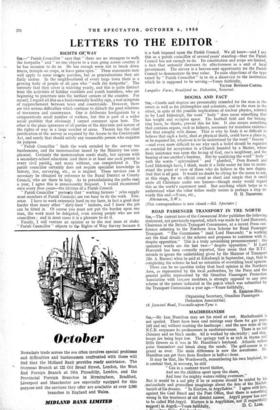LETTERS TO THE EDITOR -
RIGHTS OF; WAY SIR.—" Parish Councilor " says that " there are no strangers to walk the footpaths " and " no one objects to a man going across country if he has occasion to do so. He has enough sense not to break down fences, trample on crops, or leave gates open." These statements may well apply to some renipte parishes, but as generalisations they are flatly untrue. In the neighbourhood of every large town there is a growing body of people of all ages who " walk the footpaths". The territory that they cover is widening yearly, and this is quite distinct from the activities of holiday ramblers and youth hostellers, who are beginning to penetrate into the farthest corners of the country. For myself, I regard all-this as a fundamentally healthy sign, a real symptom of rapprochement between town and countryside. However, there are two serious difficulties which continue to disturb the good relations of townsmen and countrymen. One is deliberate hooliganism by a comparatively small number of walkers, but this is part of a wider social problem that obviously I cannot comment upon here. The other is the plain ignorance of all parties of the direction and nature of the rights of way in a large number of areas. Therein lies the chief justification of the survey as required by the Access to the Countryside
• Act, and surely that should satisfy any reasonable person who enquires its purpose.
" Parish Councillor " finds the work entailed by the survey too burdensome, and the memorandum issued by the Ministry too com- plicated. Certainly the memorandum needs study, but anyone with a secondary-school education (and there is at least one such person in every civil parish), and many without, can comprehend it. The parish councillor certainly does not require specialist knowledge in history, law, surveying, etc., as is implied. These services can if necessary be obtained by reference to the Rural District or County Council, who are there to help. As to perambulating the paths once a year, I agree this is unnecessarily frequent. I would recommend once every three years—the lifetime of a Parish Council.
" Parish Councillor " pretends that " working farmers " (who supply most members of Parish Councils) are too busy to do the work. Non- sense. I have to work extremely hard on my farm, in fact a good deal harder than many other " dirty-boot " farmers, and I know the job can be fitted in. Of course you must not put the burden upon one man, the work must be delegated, even among people who are not councillors ; and in most cases it is a pleasure to do it. Finally, I will venture an opinion as to the real issue at stake. " Parish Councilor " objects to the Rights of Way Survey because it is a task imposed upon the Parish Council. We all know—and I say this as a parish councillor of several years' standing—that the Parish Council has not enough to do. Its constitution and scope are limited, a fact that seriously decreases its effectiveness as a unit of local government. The survey is a heaven-sent opportunity for the Parish Council to demonstrate its true value. To raise objections of the type raised by " Parish Councillor" is to do a disservice to the institution which he is supposed to be serving.—Yours faithfully,
VICTOR BONHAM-CARTER.
Langaller Farm, Brushford nr. Dulverton, Somerset.


















 Previous page
Previous page